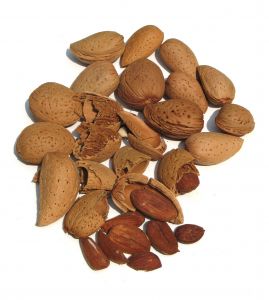 One of the most frequent causes of allergies in people all over the world, nuts are slowly becoming notorious for their allergenic properties. Just like peanuts, almond allergy can also cause a lot of pain and discomfort to the affected person.
One of the most frequent causes of allergies in people all over the world, nuts are slowly becoming notorious for their allergenic properties. Just like peanuts, almond allergy can also cause a lot of pain and discomfort to the affected person.
Today, most of the tree nuts are considered to be dangerous allergens, affecting both children and adults all over the world. Though there is no recent data available to point out the exact incidence of almond allergy, a rough estimate of the incidence is about 0.2% to 0.5% in USA alone.
Almonds contain a heat resistant protein which acts as an allergen and causes this allergy. In certain areas of the world, due to the dietary habits and climate, people are sensitized to these proteins. In such areas, the incidence of tree nut allergies is very low. Still, it has been seen that children who develop an almond allergy in their childhood, often grow out of it.
Fortunately, these heat resistant proteins are quickly disintegrated and then destroyed in the stomach. Therefore, the body is not exposed to them for long and the symptoms are almost always very mild. Substances with similar heat resistant proteins like latex, peanuts and peaches may also cause similar allergies. However, oral contact with almonds does not produce as severe reactions as some of the airborne allergies caused due to similar proteins do.
Almond Allergy Symptoms
Almond allergies occur when the immune system mistakes almond proteins for harmful substances. This misidentification triggers various symptoms, ranging from mild to severe.
Common Symptoms
- Skin Reactions: Itching, hives, eczema, or swelling around the mouth. (Source)
- Digestive Issues: Stomach pain, nausea, vomiting, or diarrhea. (Source)
- Respiratory Problems: Wheezing, coughing, nasal congestion, or a runny nose. (Source)
- Oral Allergy Syndrome (OAS): Itching or tingling in the mouth and throat after consuming almonds, often linked to birch pollen allergies. (Source)
- Anaphylaxis: A severe, life-threatening reaction characterized by difficulty breathing, swelling of the throat, rapid pulse, and loss of consciousness. Immediate medical attention is crucial. (Source)
Management
- Avoidance: Steer clear of almonds and almond-containing products. Read food labels carefully to identify potential almond ingredients. (Source)
- Emergency Plan: Carry an epinephrine auto-injector if prescribed, and ensure you and those around you know how to use it in case of accidental exposure. (Source)
- Consultation: Seek advice from an allergist for proper diagnosis and personalized management strategies. (Source)
Recognizing and understanding these symptoms can aid in the effective management of an almond allergy. Always consult healthcare professionals for accurate diagnosis and treatment options.
Almond Allergy Treatment
Since the symptoms are quite specific, the treatment usually alleviates them. When mild, the treatment can be done at home using over-the-counter drugs and home remedies. However, for severe symptoms, consultation with a doctor is necessary. Here are some of the common treatment options for almond allergy
- The foremost thing is to avoid food products that contain almonds. They usually include snacks and sweets like cakes, puddings, and chocolates.
- If the body goes into an anaphylactic shock, adrenalin injections are administered immediately.
- Over the counter antihistamines.
- If the patient develops asthma symptoms, bronchodilators may need to be used.
Almond Allergy FAQs
What is an almond allergy?
Almond allergy is a hypersensitivity to proteins found in almonds. It is generally an immune system response that causes mild to severe symptoms.
What foods should be avoided with an almond allergy?
You should avoid all products that have even traces of almonds if you are allergic to them. Do not have almond milk, butter, marzipan, or food containing almond extract. Almonds can also be found in many baked foods like cookies and cakes. It is also present in some cereals and granola bars.
Can someone with an almond allergy eat other tree nuts?
It is highly possible that someone with an almond allergy would be allergic to other tree nuts like walnuts, pecans, and cashews. Therefore, people with a tree nut allergy should avoid all tree nuts till an allergist approves it.

4 Comments
Can almond milk allergy be responsible a rash on the arms down the sides of torso?
Yes, anything with almond in it, even hair & skin products. Unlike peanuts where heat breaks down the protein and many with peanut allergy can use peanut oil as ling as it us heated above a certain temperature…a high temperature but forgot what the degree is. Goggle list of things to avoid with Almond Allergy.
I had a severe reaction yesterday…i itchy still, corner of eyes swollen & numb. My reaction prompted me to research more. Thank goodness for good ole’ EPI😊
Almond allergies have many more symptoms than what is listed. Swelling around eyes, numbness around eyes, itchy eyes, watery eyes, runny nose & severe GI stress, GI pain & diarrhea. Almond allergy can be very scary & symptoms can linger until the protein is out of your system.
My grand daughter has an allergy to dairy products, and so she drinks almond milk. She has started kindergarten in a “nut free school”, so she is not allowed to have milk. She is a small child,
And going without milk is not healthy. At the same time another child with a nut allergy is put in
Harms way. Please give me a solution to this problem. Thank you for any help you can offer.